- Home
- Pat Barker
The Women of Troy: A Novel Page 12
The Women of Troy: A Novel Read online
Page 12
I was struggling to find something to say.
Cassandra took a deep breath. “Look, what happened to me happened to hundreds of women. As soon as they heard the fighting, they ran to hide in the temples, and the Greeks knew where to look for them. There wasn’t a temple in Troy that wasn’t desecrated.”
Bugger the temples, I thought. What about the women?
Out of the corner of my eye, I saw Ritsa shaking her head. I nodded to show I understood, but then Cassandra held out her hands towards me, slightly raised so her bracelets fell back to reveal the raw skin underneath.
“They tied me to the bed. They needn’t have worried—I’m not going to kill him. It’s his wife who’ll kill him.” Her voice was dreamy, abstracted. “She makes him a hot bath, she gives him a cup of the finest wine, tells the maids to rub oil into his back, and then when he’s half asleep, dreaming and lulled and warm, she throws a net over him, she raises the axe and HITS HIM HITS HIM HITS HIM…” She banged the table with her clenched fists.
I tried to think of something to say to calm her down, but my mind had gone blank—and it was too late anyway. She was on her feet, pacing up and down, arms flailing, spit flying, bouncing off the walls. It was essentially the same rant I’d heard once already, in the arena, on the day the Trojan women were brought down to the camp.
“Let her be,” Ritsa said. “She’ll wear herself out.”
Gradually, Cassandra became calmer. At last, white-faced, she walked towards me. “You must have seen my mother?”
“She’s very concerned,” I repeated.
Her mouth twisted. “Huh. Do you know, whenever I look at my mother, I see hairs growing out of her heart?”
And with that she turned on her heel and left the room. As the door closed behind her, Ritsa shrugged, even managed a slight smile, though I felt she was being more tolerant of me than I deserved. “I’m sorry,” I said.
“Not your fault.”
“Yes, it was.”
“All right, it was.” She patted my shoulder. “You see why I turn a blind eye when she sneaks that brother of hers in? What else has she got?”
“I just hope she doesn’t give you a bad night.”
She didn’t bother replying to that. At the door, we hugged, and then I set off to walk home. As I reached the other side of the yard, I turned to look back, but Ritsa had already gone inside and closed the door.
16
It was too late to see Hecuba—and anyway, I had no good news to give her—so I went straight home. As soon as I entered the compound, I knew at once that something was wrong. Groups of men were huddled together in the yard, many of them looking over their shoulders, their eyes fixed on the door of Pyrrhus’s hall. What’s going on? I heard the question run from mouth to mouth, but nobody seemed to know the answer.
I didn’t have one either. What I did have was a knot of fear in the pit of my stomach that twisted and tightened as I threaded my way through the crowd. Entering the hut, I found Alcimus and Automedon facing each other across the table. I put bread and olives in front of them and began to pour the wine, but Alcimus waved me away, so I went and sat on the bed. Neither of them said anything; though I got the impression they had been talking before I came into the room. A few moments later, a great hammering on the door began. Thinking there must be some crisis in the women’s hut—Amina was still very much in the forefront of my mind—I ran to answer it, but Alcimus got there first and pushed me out of the way. Pyrrhus bulged into the room—there’s no other way of describing it—and, once inside, seemed to go on expanding till he was taking up every available inch of space.
“I can’t let it go!” he said, as he sat down.
I knew in my bones—in my water, as the old wives say—what “it” was, and yet I listened avidly, needing to have my worst fears confirmed. Last night—but it might have been the previous night, or even the night before that—somebody had tried to bury Priam. Made quite a good job of it, actually—the grave, though shallow, was enough to keep seagulls and marauding crows away. A shovel had been found abandoned nearby, together with a jug of wine and a few scraps of stale bread. The jug was still half full, so it seemed likely the funeral rites had been interrupted, perhaps by somebody leading horses along the path between the pastures and the yard. Who could have done it?—that was the question.
Who would have dared?
“Nobody in this compound,” Pyrrhus said. In fact, he refused to believe any Greek fighter would have done it.
Automedon tried to point out that some people had strong religious objections to leaving the dead unburied, to denying them their rite of passage into the other world. “Everybody deserves a proper burial,” he said.
“What, enemy fighters?”
“Ye-es.”
“My father didn’t bury Hector.” Evidently, he felt any reference to Achilles was enough to settle an argument. “No, it’s a Trojan—got to be.”
Alcimus pointed out patiently that there were only two Trojans in the camp. Calchus, a priest and a seer, highly respected—even if he did wear makeup and traipse about in a skirt. Could they rule him out? Well, yes, they could—almost. Why would he suddenly risk his life to bury Priam? Surely any loyalty he might once have felt to Priam was long gone; he’d worked for Agamemnon for at least the past ten years.
Alcimus was looking doubtful. “Yes, but he’s not in favour at the moment, is he? Hasn’t been for a while.”
“Can’t be him,” Automedon said. “No integrity.”
“No balls,” said Pyrrhus.
Alcimus looked from one to the other. “Well, then—that leaves Helenus.”
“Not him either,” Pyrrhus said. “He betrayed his father.”
“Under torture,” Automedon said.
“What’s that got to do with it?”
“None of us knows what we’d do under torture.”
“Huh,” Pyrrhus said, obviously thinking he did know.
“Mightn’t that be precisely why he would do it?” Alcimus asked. “A way of making good?”
They considered it.
“Ye-es,” Pyrrhus said. “I can see that.”
“Right, then,” Automedon said. “Let’s bring him in. Though if he’s any sense, he’ll have buggered off.”
“Where to?” Alcimus said. “He’s nowhere to go.”
“He could live off the land, hunt. For that matter, there’s plenty to eat in Priam’s gardens.”
“You might do that,” Alcimus said. “I doubt if Helenus would. And anyway, he can barely walk.”
This was true. I’d seen him hobbling around the camp, with blood-stained rags knotted round his ankles. Odysseus must have beaten the soles of his feet to pulp.
“Are we agreed, then?” Alcimus went on. “We bring Helenus in and— Well, what about Calchas? We can’t just drag him in—he’s a priest.”
“Invite him to dinner?” Automedon said.
Pyrrhus groaned. “For god’s sake…”
“But you agree we need a different approach?”
“Yes. Yes! Just don’t sit him next to me.”
Pyrrhus was already on his feet, obviously eager to get on with it. The others followed him to the door, both of them offering to find Helenus, but Pyrrhus insisted he had to go himself. In the end, all three of them set off together. I listened to their voices fading into the distance, and then it was quiet again, except for the buffeting of the wind.
I stared blindly at the bread and olives lying on the table, my brain scrabbling for a way of denying what I knew. I was remembering that moment by the fire when I’d glanced across at Amina and she’d lowered her eyes and pretended to adjust the strings of the lyre. I’d told myself it meant nothing; perhaps she just didn’t like me, but that was only one instance in a pattern of avoidance. And then later, she’d been missing from the circle
of girls who’d gathered round Helle. At least, I was almost certain she’d been missing; I still wasn’t entirely sure. A large part of me just didn’t believe she could be involved. The women’s hut was guarded. Yes, but she could have climbed over the fence at the back. So, I paced up and down, wondering what to do, aware all the time of a mounting anger at the conversation I’d just heard. Only two Trojans in the camp? There were hundreds of Trojans in the camp; but they were women and women are invisible. An advantage, perhaps? If Amina had buried Priam, her best chance of getting away with it was that nobody would believe a girl capable of doing it. I needed to talk to her. No matter how many times I churned these thoughts round—and I did, for upwards of an hour—I always returned to that. I needed to talk to her—and away from the hut, away from the other girls. Whatever happened to Amina, the others mustn’t be implicated.
* * *
——————
Next morning, early, I fetched four wicker baskets from the yard and went along to the women’s hut. The girls were still sitting on their pallet beds, even Helle, who was usually up early and practising dance routines in the yard. As I came in, Amina looked up and then quickly away. I tried to guess whether any of them knew about the burial; on the whole, I was inclined to think not. Amina wouldn’t have tried to involve anybody else; she’d have been too proud of the fact that she’d acted alone. Yes, but she must have been gone hours…Some of them at least would have noticed that, and might have known what she was doing—or guessed. If she’d done it. They might all, including Amina, be oblivious to anything going on outside the confines of the hut.
Before speaking to Amina, I went along the passage to Andromache’s room. I was worried about her. She was so white and thin and miserable, it occurred to me she might be one of those (rare) people who simply give up eating, who make up their minds to die. One of my mother’s maids starved herself to death. I could see her quite clearly; she had a mole on her upper lip. I hadn’t thought about that woman in years and I wondered why she came back to me so vividly now.
Andromache was in bed, apparently asleep.
“Andromache?” At the sound of her name, her eyelids fluttered. “Andromache? Wake up.”
“What’s wrong?”
“Somebody tried to bury Priam.”
Her eyes were wide open now. “Helenus?”
“Perhaps. Actually, I think it might have been one of the girls.”
“Who? Which one?”
She did sound genuinely incredulous. Whatever had happened, it must have been without her knowledge. “Amina.”
“Is she the one who danced?”
“No, that’s Helle.”
For the first time, I felt impatient, resentful even, that she took so little interest in the girls, refusing to accept what should have been her role; hers, not mine. And then I felt ashamed, because I didn’t know what it was like to have a child killed; I was afraid even to imagine it. And I certainly had no right to judge her.
“I’m going to take her out, see if I can get her to talk to me.”
“All right.” She sat up and wrapped her thin arms round her knees. “I’m glad he’s buried.”
“Yes, me too—as long as Pyrrhus doesn’t kill somebody for doing it. They’re going to question Helenus, but they won’t stop there…”
Amina was folding her blanket when I went back into the other room. The air was full of the smell of young, unwashed bodies and their slightly sour, early-morning breath. Somehow or other I was going to organize baths for all of them. There was so little I could do. Suddenly, I was furious, almost to screaming point, at this confinement to one tight little space that was being imposed on us by the violence of wind and sea—and by the far more lethal violence of our captors. But then, I reminded myself, there was no “us” now. No “we.” I wasn’t a slave anymore—and perhaps that’s why I suspected them of hiding things from me. I hoped they trusted me, but they must also have looked at my pregnancy, my fine clothes, my Greek husband—and wondered where my loyalties really lay. I could scarcely blame them, when I was so aware myself of all the possible conflicts. Trojan mother, Greek baby—how was that going to work out?
“Amina.” I heard my voice, sharper than I’d intended. “I’m going to get some fresh herbs. I want you to come with me.”
I held out two of the baskets. Amina could have refused, but perhaps she didn’t know that—or perhaps she was tempted by the thought of fresh air, a few hours away from the hut.
“Yes,” she said, simply. She turned to one of the other girls asking her if she could put her blanket and bed away. I’d already reached the door, glad to get away from the frowsty atmosphere. Even the wind snatching the door from my grasp and slamming it shut behind me was welcome. After a few minutes, when I was just about to go inside to fetch her, Amina joined me, muffled from head to toe in her usual black cloak.
“I didn’t know there was a herb garden in the camp.”
Her tone was chatty. I thought she was trying for normality, hoping against hope I hadn’t guessed.
“There is, just a small one, up on the other headland—but we’re not going there. We’re going to Troy.”
Her eyes widened. Perhaps she dreaded going back, and who could blame her? Though she needn’t have worried; I had no intention of entering the city. Priam’s orchards, the kitchen garden, the herb garden—all lay outside the walls. The orchards had been Odysseus’s and Diomedes’s favourite hunting ground for capturing prisoners, because people had to go there; they had to risk their lives to get basic supplies. Helenus had been captured in his father’s orchards—and that fate had befallen more than one of Priam’s sons.
We set off through the narrow gap in the trench. It had been dug to defend the camp in the time-before-time when it still seemed possible the Trojans would win the war—before Achilles, intent on avenging Diomedes’s death, had returned to the fighting. Now the trench lay abandoned, wheelbarrows and spades stacked up against the sides. I wondered if that was where the spade used to bury Priam had come from; I glanced sideways at Amina, but she was staring straight ahead. At Troy, of course. At the ruined towers.
I knew there was a path by the river, but we’d have to cut across the battlefield to get to it. We walked in silence, Amina lagging behind, which was mildly irritating but I managed not to say anything. The ground was so uneven, I had to plan where to put my feet. Deep ruts scarred the surface, old wounds inflicted by chariot wheels and the tramp of marching feet—like memories carved into the land. This plain had once been farming land: the soil heavy, black, too good to pasture cattle, made for growing grain. That’s how it was meant to be and how it had been for hundreds, perhaps thousands, of years—until the black ships came.
The day was overcast, though by now we’d given up expecting rain. It was heavy going stumbling across the churned-up ground; I felt sweat prickling in my armpits; my back and thighs ached. At last, I was forced to stop. Amina, still following along behind, her gaze, like mine, fixed on the ground, cannoned into me. We stood getting our breaths back, looking around. I’d seen this battlefield from the ramparts of Troy when it was thick with struggling backs, men grappling each other to the death, while, high above them, the kings rode in their glittering chariots. Now it was empty, desolate.
Perhaps pausing for breath had been a mistake, because having once looked up I found I couldn’t go back to staring at my feet. So, as we walked on, I was alert to everything. There was something eerie about this silence; it was like the silence you hear in empty rooms when somebody you love has died—toxic. The trees had been cut down to build the Greek camp and without them the land looked naked, indecent, with not a shred of cover to hide its disfigurements. In some places, water had seeped up from the earth, from the clayey depths, filling dips and craters to the brim. Now and then, bubbles broke the surface from god knows what decomposition going on below. We
had to splodge through several of these miniature lakes before we reached the path that ran beside the river. Here, at least, there was sound—water rippling over the stones—but this only served to heighten the silence of the battlefield.
Rounding a bend in the river, we came across a corpse, several weeks dead, bloated inside its battle shirt, the lower regions pitifully exposed. Neither the water nor the land had claimed him and so he lay there, his face mercifully turned away. I saw Amina put her veil to her mouth as if she were afraid of being sick, but when I reached out to touch her arm, she shook her head violently and moved away.
As we got closer to the city, there were sounds loud enough to fracture the silence: the strident cries of crows circling above the smouldering citadel. Crows are ferociously intelligent birds. I used to watch them gather as the men set off for another day of war. Drums, pipes, trumpets, the rhythmical pounding of swords on shields—to the fighters, this music meant honour, glory, courage, comradeship…To the crows, it only ever meant food. They didn’t care who won or lost; their day always ended well.
We stopped again, looking at the city’s smoking towers. I wondered if Amina was thinking of brothers or cousins lying dead inside the walls. I’d lost four brothers when my city, Lyrnessus, fell—and the thought of their unburied bodies tormented me for months after their deaths. And it still did—on the rare occasions I allowed myself to think about it at all. But they were dead—there was nothing I could do to help them—she was still alive.
“Come on,” I said. “It’s not far.”
“I know where it is.”
A path ran all the way round the city walls. As we began to walk along it, I had a sudden memory from my time in Troy, of how, in the shadow of the high walls, the flowers would close long before nighttime. There were banks of pale, starlike flowers around us now and some of them had already begun closing, their petals puckering like lips. I saw Amina glancing repeatedly over her shoulder, perhaps hoping some Trojan guerrilla band, men who’d miraculously survived the massacres, would appear and rescue her, but there was only the cawing of the crows that went on circling the black towers, as if fragments of charred wood had taken off and lifted into the air. At first, their cries were the only sound, but then I heard another, an insensate buzzing of flies from inside the walls, worse by far than the calling of the crows.

 Border Crossing
Border Crossing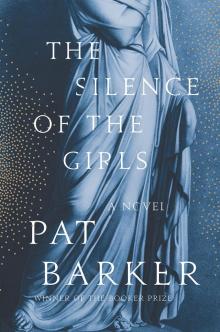 The Silence of the Girls
The Silence of the Girls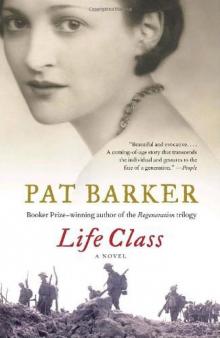 Life Class
Life Class Regeneration
Regeneration Another World
Another World The Ghost Road
The Ghost Road Double Vision
Double Vision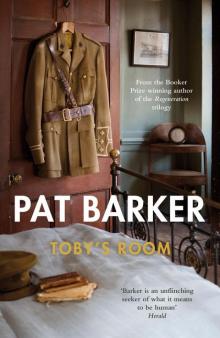 Toby's Room
Toby's Room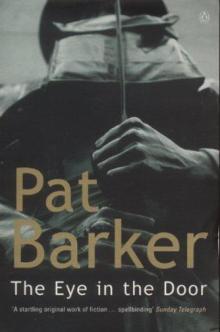 Regeneration Trilogy 02 - The Eye in the Door
Regeneration Trilogy 02 - The Eye in the Door The Eye in the Door
The Eye in the Door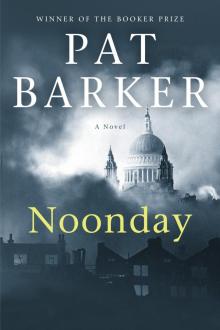 Noonday
Noonday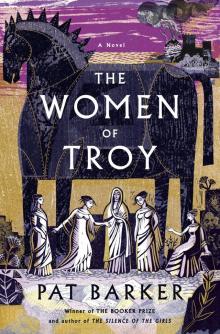 The Women of Troy: A Novel
The Women of Troy: A Novel